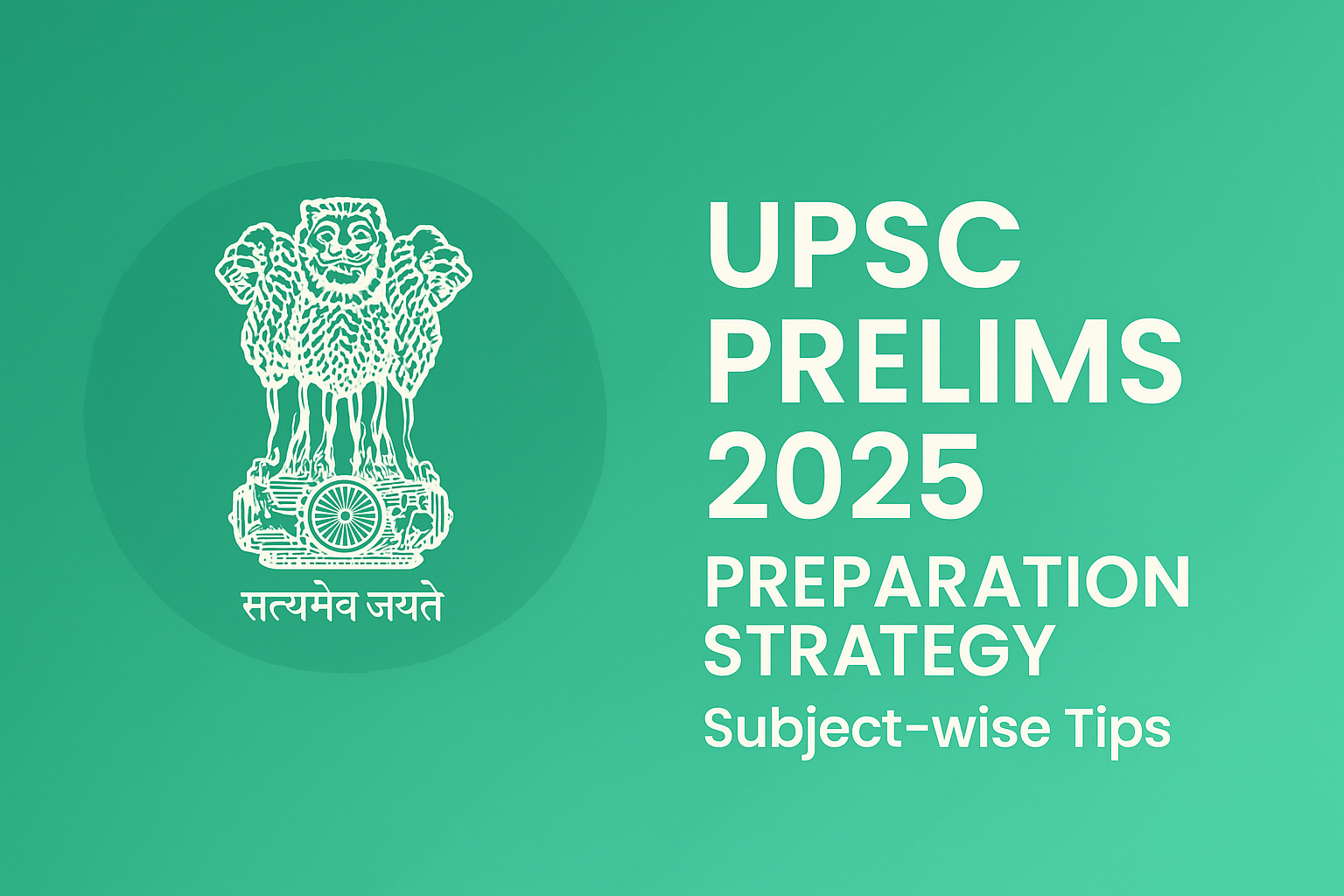UPSC Prelims 2025 Preparation Strategy: Subject-wise Tips & Study Plan
The UPSC Civil Services Examination is one of India’s toughest competitive exams, and the UPSC Prelims 2025 is the first major hurdle. With lakhs of aspirants competing for limited seats, having a smart and structured UPSC Prelims 2025 preparation strategy is essential. This guide provides a detailed subject-wise approach, a 100-day study plan, recommended booklist, mock test schedule, and actionable tips that can significantly improve your chances of success.
UPSC Prelims 2025 Exam Overview
The Preliminary Examination is the screening stage of the UPSC Civil Services Exam. It consists of two papers conducted on the same day:
- Paper I – General Studies (GS): 100 questions, 200 marks, 2 hours.
- Paper II – CSAT: 80 questions, 200 marks, 2 hours (qualifying, minimum 33% required).
Negative marking: For every wrong answer, 1/3rd of the marks are deducted (−0.66 in GS and −0.83 in CSAT). Accuracy is therefore as important as coverage.
Qualifying criteria: Marks of GS Paper I are considered for the cut-off, while CSAT is only qualifying. However, failing CSAT eliminates you regardless of your GS score.
General UPSC Prelims 2025 Preparation Strategy
Many aspirants focus only on coverage but neglect consistency. The key is to combine concept clarity, revision, and test practice. Here’s a general strategy:
- Start with NCERTs: These form the foundation. Cover NCERTs from Classes 6–12 for History, Geography, Economy, and Polity.
- Daily Current Affairs: Read The Hindu or Indian Express daily. Supplement with monthly current affairs magazines.
- Integrated Preparation: Prepare Prelims and Mains together. For example, Polity and Economy notes can serve both stages.
- 3R Approach: Read → Revise → Retain. Revision cycles are as important as the initial study.
- Regular Mock Tests: Practice tests simulate the real exam. Begin with one per week and increase frequency closer to the exam.
Subject-wise Preparation Tips for UPSC Prelims 2025
UPSC Prelims covers a wide variety of subjects. Here’s a subject-wise strategy:
1. History
Prioritize Modern History from Spectrum (Rajiv Ahir). NCERTs are enough for Ancient and Medieval History. For Art & Culture, use Nitin Singhania and CCRT notes. Expect 15–20% weightage.
2. Polity
M. Laxmikant is the bible. Revise it at least three times. Pay special attention to fundamental rights, directive principles, Parliament, President, and recent constitutional amendments.
3. Geography
Read NCERTs + G.C. Leong. Focus on physical geography, climatology, Indian rivers, agriculture, and map-based questions. Supplement with current affairs related to the environment and climate change.
4. Economy
Cover Class 11 & 12 NCERT Economics for basics. Use the Economic Survey and the Union Budget for an advanced understanding. Daily news helps with inflation, fiscal policy, and government schemes.
5. Environment & Ecology
This has gained prominence in recent years. Use Shankar IAS Environment and revise current events related to biodiversity, pollution, climate reports, and international conventions.
6. Science & Technology
Focus on ISRO missions, biotechnology, nanotechnology, health schemes, IT developments, and defense technology. Basic NCERT science is enough for factual questions.
7. Current Affairs
This is dynamic and can make or break your attempt. Focus on government schemes, international organizations, important reports, and socio-economic developments.
8. CSAT
Though qualifying, CSAT has become tougher. Practice comprehension, logical reasoning, and quantitative aptitude regularly. Books like the CSAT Manual by Arihant or practice sets are useful.
100-Day UPSC Prelims Study Plan
A well-structured 100-day plan is crucial. Here’s a suggested breakdown:
- Days 1–30: Complete NCERTs + Polity (Laxmikant) + Modern History (Spectrum).
- Days 31–60: Cover Economy, Geography, Environment, and compile Current Affairs notes.
- Days 61–80: Intensive revision + 20 full-length mocks. Analyze mistakes thoroughly.
- Days 81–100: Final revision cycles, PYQs, and CSAT practice. Focus on weak areas.
Recommended Booklist for UPSC Prelims 2025
- NCERTs (6th–12th) – History, Geography, Polity, Economy
- Indian Polity – M. Laxmikant
- Modern India – Spectrum
- Geography – G.C. Leong
- Environment – Shankar IAS
- Economic Survey & Union Budget
- Monthly Current Affairs compilations (Vision IAS/Insights/PT365)
Importance of Previous Year Questions (PYQs)
UPSC has a pattern of repeating concepts. Solving PYQs helps in two ways:
- Understanding the trend and type of questions.
- Identifying high-yield topics (e.g., Polity and Environment in recent years).
Revise at least the last 10 years’ Prelims papers for both GS and CSAT.
Mock Tests & Revision Strategy
Mocks are your exam rehearsal. Without them, accuracy never improves. Follow this plan:
- Phase 1 (3 months before exam): 1 mock per week.
- Phase 2 (Last 2 months): 2–3 mocks per week.
- Phase 3 (Final month): Full test series with daily revision of mistakes.
After each test, note down mistakes in a “correction notebook” and revise them weekly.
Time Management in UPSC Prelims
Managing time in the Prelims exam hall is as critical as preparation:
- GS Paper: First attempt easy and confident questions, then medium, and finally the guesswork ones. Don’t spend more than 1.2 minutes per question.
- CSAT: Prioritize comprehension and reasoning first. Numericals can be attempted later if time remains.
FAQs on UPSC Prelims 2025 Strategy
Q1. How many hours should I study daily?
A minimum of 8–10 focused hours is recommended. Consistency is more important than raw hours.
Q2. Is coaching necessary for Prelims?
No. With NCERTs, standard books, and self-discipline, many aspirants clear without coaching.
Q3. When should revision start?
From Day 1. Revise weekly and monthly. The last 20 days before the exam should be only revision and mock practice.



1 thought on “UPSC Prelims 2025 Strategy”